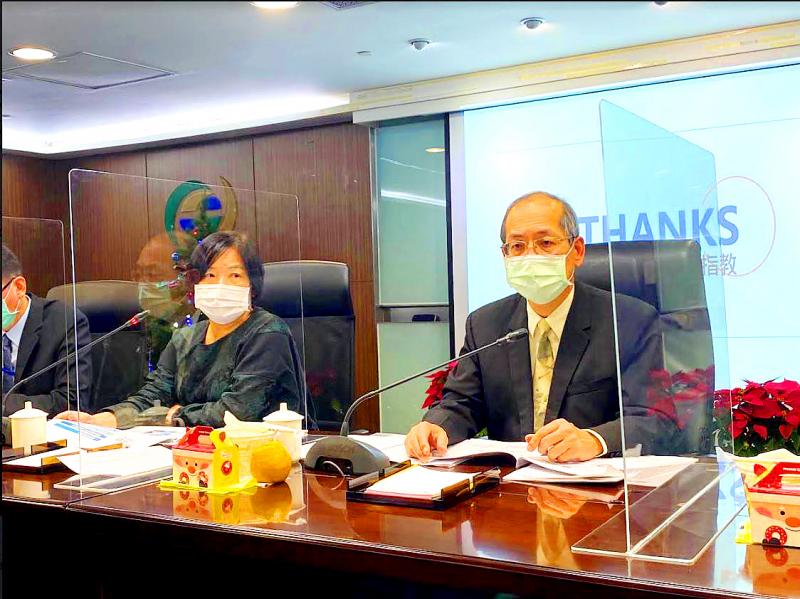The Financial Supervisory Commission (FSC) yesterday announced that it would allow Web-only life and property insurers to launch, its latest effort to push for virtual financial services since rules for Web-only bank were eased in 2018.
A Web-only insurer cannot sell policies through physical channels or through salespeople, the commission said.
Its sales must be carried out completely online, it said.

Photo: Kao Shih-ching, Taipei Times
Unlike virtual banking licenses, which have a fixed quota, the FSC does not plan to limit the number of operating licenses to be issued to virtual insurers, Insurance Bureau Director-General Shih Chiung-hwa (施瓊華) told a news conference in New Taipei City.
“We will concentrate on the feasibility and innovation of the applicants’ business models,” Shih said. “If an applicant is apt to succeed, we will grant it the license.”
A virtual property insurer must develop innovative policies that conventional property insurers do not offer, so applicants hoping to set up a Web-only operation must present preliminary ideas or plans, Shih said.
“New risks have been created as a new economy emerges amid digitalization, and we hope new insurance policies can cover these risks,” she said.
For example, offices and vehicles are being shared more often, so the risk should be distributed differently than for an asset owned by an individual, she said.
A virtual life insurer must focus on providing protection-type policies, which conventional life insurers seldom highlight in their marketing, Shih said.
“Up to 18 life insurers and 16 property insurers already sell their products online, so Web-only insurance companies must offer different products than what is available and conduct their business differently,” she said.
On average, only 69 percent of Taiwanese have purchased at least one insurance policy, so the FSC hopes that Web-only firms will stimulate inclusive insurance by offering more choices, Shih said.
A virtual insurer must be at least 40 percent owned by a financial institution, and of the 40 percent stake, at least 25 percent should be owned by a life insurance firm or financial conglomerate with an insurance unit to ensure that the new venture is able to comply with insurance regulations, Shih said.
Companies outside the financial sector, such as firms with a fintech, big data analysis, software development, Internet of Things or wireless communications focus, are welcome to invest in virtual insurers, with 60 percent being the largest stake they can hold, she said.
Applications are to open in August after public hearings and possible amendments of the regulations, Shih said, adding that the commission would release the results of a review of the deployment in April 2023.
An online-only life insurer’s paid-in capital would need to be at least NT$1 billion (US$35.94 million), while an online-only property insurer would need at least NT$2 billion, the commission said.

South Korea’s equity benchmark yesterday crossed a new milestone just a month after surpassing the once-unthinkable 5,000 mark as surging global memory demand powers the country’s biggest chipmakers. The KOSPI advanced as much as 2.6 percent to a record 6,123, with Samsung Electronics Co and SK Hynix Inc each gaining more than 2 percent. With the benchmark now up 45 percent this year, South Korea’s stock market capitalization has also moved past France’s, following last month’s overtaking of Germany’s. Long overlooked by foreign funds, despite being undervalued, South Korean stocks have now emerged as clear winners in the global market. The so-called “artificial intelligence

Chinese artificial intelligence (AI) start-up DeepSeek’s (深度求索) latest AI model, set to be released as soon as next week, was trained on Nvidia Corp’s most advanced AI chip, the Blackwell, a senior official of US President Donald Trump’s administration said on Monday, in what could represent a violation of US export controls. The US believes DeepSeek will remove the technical indicators that might reveal its use of American AI chips, the official said, adding that the Blackwells are likely clustered at its data center in Inner Mongolia, an autonomous region of China. The person declined to say how the US government received

FORTUNES REVERSED: The new 15 percent levies left countries with a 10 percent tariff worse off and stripped away the advantage of those with a 15 percent rate In a swift reversal of fortunes, countries that had been hardest hit by US President Donald Trump’s tariffs have emerged as the biggest winners from the US Supreme Court’s decision to strike down his emergency levies. China, India and Brazil are among those now seeing lower tariff rates for shipments to the US after the court ruled Trump’s use of the International Emergency Economic Powers Act to impose duties was illegal. While Trump subsequently announced plans for a 15 percent global rate, Bloomberg Economics said that would mean an average effective tariff rate of about 12 percent — the lowest since

Standard Chartered Bank Taiwan’s newly appointed chief executive officer, Anthony Yu (游天立), yesterday unveiled an ambitious growth strategy for the bank’s wealth management division, reflecting a bullish outlook on Taiwan’s high-net-worth market. Yu, the first local executive to lead Standard Chartered Bank’s Taiwan operations, emphasized rising client demand and detailed plans to expand the bank’s digital capabilities, as well as its physical presence across the country. Standard Chartered Taiwan saw a remarkable surge in new wealth management clients last month, with the number of clients holding assets equivalent to US$1 million more than doubling compared with the same month last year, he